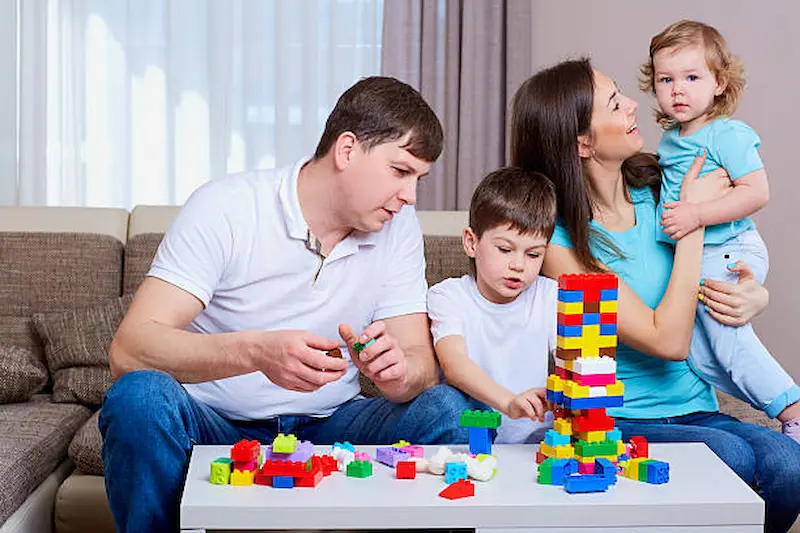Parenting tips refer to practical pieces of advice and strategies aimed at guiding parents in raising and nurturing their children effectively. Effective fatherhood is crucial for a child’s overall development, influencing their self-esteem, social skills, and emotional intelligence. A supportive and involved father figure fosters a sense of security, encouraging healthy relationships and resilience. Parenting tips play a vital role in guiding single fathers, offering practical insights on balancing responsibilities, fostering strong connections, and navigating challenges for a fulfilling parenting journey.
In this blog, you’ll find invaluable parenting tips designed to empower and guide parents through the intricate journey of raising children. From fostering open communication to establishing consistent routines and promoting positive reinforcement, these tips offer practical insights to enhance your parenting skills and create a nurturing environment for your child’s growth and development.
Table of contents
- Emotional Well-being
- Building a Support System
- Balancing Work and Parenting
- Financial Planning
- Setting Boundaries
- Nutritional Needs
- Physical and Emotional Health
- Dealing with School and Education
- Handling Chores and Housekeeping
- Bonding and Quality Time
- Coping with Teenage Challenges
- Co-Parenting Challenges
- Balancing Social Life
- Addressing Gender-Specific Challenges
- Conclusion
- Frequently Asked Questions ( FAQs )
Emotional Well-being

A. Coping with Grief and Loss:
Single dads navigating grief and loss, whether through divorce, separation, or the death of a partner, benefit from acknowledging and processing emotions. Establishing a healthy routine, seeking therapy, and engaging in activities that bring solace can aid in the healing process.
B. Seeking Emotional Support:
Building a robust support network is crucial. Single dads can turn to friends, family, or support groups to share their experiences and emotions.
Open communication fosters understanding, while professional counseling provides a confidential space for addressing complex feelings and developing coping mechanisms.
C. Self-Care Strategies for Single Dads:
Prioritizing self-care is vital. Single fathers can maintain emotional well-being by setting boundaries, practicing mindfulness, ensuring adequate rest, and incorporating enjoyable activities into their routine. Balancing responsibilities with self-nurturing activities enhances overall mental health, enabling single dads to navigate challenges with resilience and strength.
Building a Support System

Establishing a robust support system is vital for single dads facing the complexities of parenting, including teaching kids responsibility. Cultivate connections with friends, family, and community resources to share responsibilities and emotional burdens. Communicate openly about needs and seek assistance when required. Joining support groups or networks for single parents can provide valuable insights, practical advice, and a sense of camaraderie. Nurturing a reliable support system, along with instilling the importance of responsibility in children, fosters resilience, helping single dads navigate challenges more effectively and ensuring a well-rounded foundation for their parenting journey.
Balancing Work and Parenting

Achieving a harmonious balance between work and parenting as a single parent, including co-parenting when applicable, requires strategic planning and flexibility. Prioritize tasks, set realistic goals, and communicate with employers about potential challenges. Establish a reliable support network, including friends, family, or childcare services. Utilize time-management techniques to maximize efficiency and maintain quality time with your child. Striking a balance between professional responsibilities and parenting, with co-parenting considerations, ensures a more fulfilling and manageable life for both single parents and their children.
Financial Planning

A. Creating a Budget:
Single dads can achieve financial stability, including budgeting for kids, by crafting a detailed budget that outlines income, expenses, and savings goals. Prioritizing essential needs and allocating funds wisely provides a foundation for financial security.
B. Financial Resources and Assistance:
Explore available financial resources and assistance programs, such as government aid and community services. Understanding eligibility criteria and seeking guidance can ease financial burdens and offer crucial support during challenging times.
C. Saving for the Children’s Future:
Prioritizing savings for children’s education, emergencies, and future needs, including exploring the best savings account for kids, ensures a secure financial future.
Utilizing savings accounts, investment options, and educational funds empowers single dads to provide long-term financial stability for their children.
Setting Boundaries
Establishing clear boundaries is crucial for the well-being of single dads in the realm of single parenting. Define limits on personal time, work commitments, and social interactions to maintain a healthy balance. Communicate these boundaries with openness and assertiveness, ensuring that others understand and respect your needs in the context of single parenting. Prioritize self-care and family time, and don’t hesitate to say no when necessary. Setting boundaries not only preserves your physical and emotional energy but also contributes to a more fulfilling and manageable lifestyle, promoting a positive and sustainable approach to single parenting.
Nutritional Needs

Meeting nutritional needs is crucial for single dads fostering their children’s well-being. Prioritize a balanced diet rich in fruits, vegetables, whole grains, and proteins to support growth and development. Plan meals ahead, involving children in food choices and preparation, and consider incorporating healthy snack ideas. Utilize time-saving cooking methods and explore affordable yet nutritious options.
Regularly assess dietary habits and make adjustments as needed. By ensuring a wholesome and varied diet, single dads contribute significantly to their children’s physical health and lay the foundation for lifelong well-being.
Physical and Emotional Health
Maintaining both physical and emotional health is essential for overall well-being. Regular exercise, a balanced diet, and sufficient sleep contribute to physical vitality. For emotional health, fostering positive relationships, practicing mindfulness exercises for kids, and seeking support when needed are crucial. Acknowledging and expressing emotions constructively promotes a healthy emotional state. Striking a balance between physical and emotional self-care enhances resilience, enabling individuals to face life’s challenges with strength and a positive mindset.
Dealing with School and Education

Navigating the educational aspects of single parenthood requires proactive involvement. Stay engaged with your child’s academic progress by attending parent-teacher meetings, communicating with educators, and actively participating in school activities. Establish a consistent homework routine and provide a dedicated study space at home. Advocate for your child’s needs, seek educational resources, including reading for kids, and foster a positive attitude towards learning. By prioritizing education and maintaining open communication with school personnel, single parents can contribute significantly to their child’s academic success and overall well-being.
Handling Chores and Housekeeping
Efficiently managing chores and housekeeping as a single dad involves prioritizing tasks and creating a structured routine. Delegate age-appropriate responsibilities to children, teaching them valuable life skills while lightening the workload. Utilize time-saving strategies such as meal planning and organizing cleaning schedules. Consider seeking external help or establishing a support network for particularly challenging tasks.
Maintaining a tidy and organized home environment contributes to a positive atmosphere, reducing stress and fostering a sense of accomplishment for both single dads and their children.
Bonding and Quality Time
Fostering strong bonds through quality time is paramount for single dads. Prioritize shared activities that cater to your child’s interests, creating cherished memories. Establishing routines, such as regular meals or outings, nurtures a sense of security. Actively listen and engage in meaningful conversations, reinforcing trust and understanding. Introduce elements of positive thinking for kids to encourage optimism and resilience. Be present, both physically and emotionally, to strengthen the parent-child connection. Quality time not only deepens the bond but also provides a stable foundation for your child’s emotional well-being and overall development.
Coping with Teenage Challenges

Navigating the complexities of parenting teenagers as a single dad requires open communication and understanding. Stay involved in your teen’s life, actively listening to their concerns and fostering a supportive environment. Establish clear expectations while allowing space for independence. Address issues with empathy, offering guidance rather than imposing control. Stay informed about their social circles and interests. By maintaining a balance between support and autonomy, single dads can navigate the challenges of parenting teenagers with resilience and strengthen their parent-child relationship.
Co-Parenting Challenges
Navigating co-parenting challenges demands effective communication and a child-centered approach. Maintain clear and respectful communication with the other parent, focusing on the child’s best interests and promoting positive parenting. Establish consistent routines and rules between households to provide stability. Be flexible and willing to compromise, adapting to changing circumstances. Seek professional mediation if necessary. Prioritizing the child’s well-being over personal conflicts fosters a healthy co-parenting dynamic, ensuring a more harmonious environment for children to thrive despite the complexities of separated parenting.
Balancing Social Life

Achieving a harmonious social life involves finding equilibrium between personal and social commitments. Single dads can maintain connections by scheduling quality time with friends and family while also allowing for moments of solitude. Prioritizing relationships that contribute positively to well-being and engaging in activities that foster social connections help strike a balance and promote good habits for kids. Setting boundaries, communicating openly about availability, and being intentional about social interactions contribute to a fulfilling social life that complements the responsibilities of single parenthood.
Addressing Gender-Specific Challenges
Navigating gender-specific challenges as a single parent involves promoting inclusivity and understanding. Recognize and embrace the unique needs and experiences of each gender. Foster open communication about gender-related topics, encouraging questions for kids and discussions. Provide positive role models and challenge stereotypes to create an environment where children feel supported regardless of their gender identity.
By addressing these challenges with sensitivity and openness, single parents can empower their children to navigate the complexities of gender with confidence and acceptance.
Conclusion
Parenting tips provide practical guidance for navigating the complexities of raising children, offering insights into effective communication, positive discipline, and fostering emotional well-being. Embracing these tips not only enhances the parent-child relationship but also contributes to the overall development of children, promoting resilience, self-esteem, and a nurturing family environment.
Elevate your child’s learning journey with BrightChamps, the leading EdTech company offering a transformative blend of robotics, financial education, and coding courses.
To get your hands on more such articles, educational content, and free resources on coding for kids, robotics courses, game development, etc., check out the BrightCHAMPS Blog Page now!
Frequently Asked Questions ( FAQs )
A1. Single dads can seek emotional support through friends, family, support groups, or counseling to navigate the challenges of parenting alone.
Q2. What are some practical self-care tips for single fathers?
A2. Practical self-care tips for single fathers include setting boundaries, prioritizing sleep, maintaining social connections, and delegating responsibilities when possible.
Q3. How can single dads manage work and parenting effectively?
A3. Single dads can effectively manage work and parenting by creating a realistic schedule, outsourcing tasks, communicating with employers about flexible options, and seeking support from coworkers or a reliable childcare network.
Q4. What financial resources are available for single dads?
A4. Financial resources for single dads may include government assistance programs, child support, budgeting tools, and seeking advice from financial counselors.
Q5. How do I communicate with my children about the changes in the family?
A5. Communicate openly with your children about family changes, emphasizing love and reassurance, and maintaining consistent, age-appropriate communication to help them adapt to the new family dynamics.


 We are an army of educators and passionate learners from BrightChamps family, committed to providing free learning resources to kids, parents & students.
We are an army of educators and passionate learners from BrightChamps family, committed to providing free learning resources to kids, parents & students.










